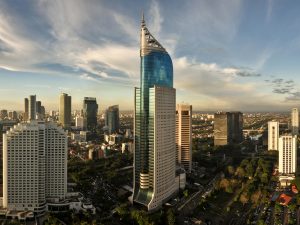In conversation with
Mr. Bong Chandra
CEO and Founder | Triniti Property Group

Bong Chandra: Our competitive advantage is our focus on the millennial market. There are over 100 million people in Indonesia under the age of 29 years old which is a huge market potential. The new generation of millennials love to own property, but not just for pure functionality; they also want to buy into the concept of the development. They love the story behind the product. For example, in some of our past developments, we have played on the design of incorporating earth, wind, water, fire and metal. In our 5th and newest development called The Smith, we have called it the home of start-ups. We understand that generation Y and the millennials have more entrepreneurial spirit than previous generations, so we have created an integrated development that permits our customers to live, work, play and thrive.
FDI Spotlight: What is this strategy to capture the attention of the Millennial audience?
Bong Chandra: As we have quite a young team here, we are afforded the luxury position of understanding the needs of millennial consumers. From our research into the challenges that millennials face, we know that the major difficulty that this generation experiences in getting onto the property ladder are access to capital.
This stems from the reluctance for them to save, and even if they put their money into a saving account, by the time they have saved enough to put a down payment on a place, the house prices have increased at a faster rate than the interest and contributions into the bank account. In this way, it can seem impossible for millennials to get their first place.
This is why we have created our own attractive property saving plan intended to incentivise millennials into putting a sum a way for minimum 24 months so they can put down the deposit on their first place. The name of the plan is Nabung Properti (www.nabungproperti.com), and the basic principle is that if a saver opens an account with us and transfer funds into it for a minimum of 24 months, they will pay for the down payment in 2019. However, they will pay the amount it was valued when the account was first opened in 2017. This way, our savers can have the assurance and confidence that their saving and budgeting will help them fulfil their dream of buying their own home.
As the living standards and quality of life improve for all Indonesians, tastes change and develop. How do your developments capture this changing taste towards holistic, integrated living spaces?
Bong Chandra: It is well known infrastructure and traffic is a big problem here in Indonesia. Because of this, families want to have the convenience of their homes near good public transportation, shopping, schools and hospitals. That is why property buyers are looking at integrated developments that offer all of these facilities in one convenient location.
We can see that as the burgeoning middle class becomes more ambitious and career minded, they are spending less time with their family and friends than before. So the free time they have in the evenings and on weekends are precious, and so they do not want to spend that time stuck in a traffic jam.
This is why we are committed to developing properties with both internal facilities and being located close to necessary external facilities. Another trend we can look at is one difference between Singaporean apartments and Jakartan apartments.
In Singapore, when you buy an apartment, you do not get a parking space, because the public transport system is so clean and convenient. The same can not be said for all of Jakarta, as a result, most people drive their own cars, so every unit must also have an allocated parking space, which can become costly. We promise a parking space for every single homeowner for every development we build. We come up more expensive than some of the other players in the market. However, we are happy to educate our customer. We have their best interests at heart.
How have you created an ecosystem of innovation here?
Bong Chandra: I think the key to creating an innovative ecosystem is by recruiting young people. Of the 2000 staff we employ, over 70% of them are under the age of 30. To be innovative, you need to break the old rules and patterns. The beauty of employing younger people is that they are not confined to process and procedure as much, and as a result, they are much more creative and brave. This is how we shake things up and disrupt the status quo.
What is your approach to partnership and how can you see Indonesian companies attracting foreign investors?
Bong Chandra: I think we have, to be honest with ourselves and state we are very much still a developing country. This is why when looking for investors, we should not just be looking for capital, but also to find partners willing to provide a transfer of knowledge to help us as a nation grown and develop. From the Government’s side they have brought in new policy regulations, and in particular, the tax amnesty has made a huge impact. In figures, over 4000 trillion IDR has been collected since the start of the tax amnesty in new investment. So between finding the foreign partner with an alignment of values while also providing an attractive regulatory environment, we should continue to speed up FDI coming into the country.
What does the future have in store Triniti property group?
Bong Chandra: 2017 marks the celebration of our superblock mixed-use development. In 2018 we want to build a suburban city in the Sentul area complete with residential, commercial, retail shopping malls and a 5-star hotel. The purpose of this is that in 2019, we are looking to do an IPO and go public. Therefore it is critical for us to generate recurring income assets which are what the hotel and retail malls will provide to attract investors.
What is your message of confidence to the international investment community?
Bong Chandra: Foremost you cannot miss the Indonesian demographic bonus for the next ten years is the most exciting demographic group for business and investment. Multiply that because the middle class is continuing to grow; the World Bank has predicted that in the next five years that the GDP per capita of Indonesia will rise from USD 3000 to USD 5000. The final point I would like to make is that with 17,000 islands, the potential for property development and infrastructural growth is high, you need to get out of Jakarta otherwise you only see 1% of the population and 1% of the potential.

